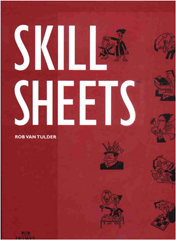Skills research
SKILL SHEETS:
A Student’s Guide to the International Bargaining Society
When starting any type of advanced study after high-school, you are faced
with the challenge of a sizable attitude breach. The information load you
are facing is often overwhelming; you are expected to study large amounts
of material in a disciplined manner, gather information yourself, work together
with other students that come from different places (and cultures sometimes)
and create new information. Students are largely self-responsible for their
own progress, their achievements, with relatively little external control
or incentives from the educational institute. There are no laws forcing you
to study and hardly any parents left (or able) to check whether you are doing
your ‘homework’. Tutors can enthuse a nd encourage students to
study, but in the end it all comes down to your own intrinsic motivation
and your ability to adapt to this new style of learning.
nd encourage students to
study, but in the end it all comes down to your own intrinsic motivation
and your ability to adapt to this new style of learning.
Moreover, academia is less and less a place where in splendid isolation from
daily worries, scientists and students work together on searching ‘the
truth’ and accumulating knowledge and skills. Academia has become part
and parcel of the international bargaining society. Faculty staff member
themselves are often engaged in a ‘publish or perish’ rat race
and struggling with an increasing and diverse set of claims and activities.
Students increasingly bargain over grades, contents and in particular the
work load of courses - confronted as they are with an increasing and diverse
set of claims and ambitions in a complex society with large choice possibilities.
The Skill Sheets collection is designed as a tool to guide a student through
this process of continuous bargaining over the conditions and contents of
your learning environment. It supports the student to link the most relevant
skills at ever higher levels of mastery and sophistication. The philosophy
is that only a holistic approach to skills learning and a high level of mastery
of skills can help you to withstand the negative consequences of the bargaining
society – including the pervasive pressure you will face to give in
to calculating behaviour yourself.
But even the simplest of skills are relatively complex. None of them are
solely “product” or “process” oriented. Sometimes
the skills are easy to train and master, but more-often they require intensive
training throughout longer time periods. To make the skills development process
relevant, interesting and rewarding, skills always have to be linked
to real research topics and content, otherwise you will only learn a number of ‘tricks’ without
substance. So you will have to be able and willing to grasp and deal with
complex problems already in a very early phase of your training. The Skill
Sheets are designed to support tutors and students around the world in this
training process. They identify the basic skills in each of seven skill areas
that everybody should/could master and give you very concrete pointers and
minimum standards for each skill: study skills, research, (project) management,
listening, writing, reading and presentation.
The Skill Sheet approach consists of a basic book and a website. The Skill
Sheets book contains a formula that is developed by Rob van Tulder at the
RSM Erasmus University. The formula exists since 1995 and is used by thousands
of students throughout the whole curriculum of RSM and a number of other
universities. In 2004-2006 the Skill Sheets have been upgraded in collaboration
with a large number of students, managers and teachers. The loose-leaf system
has given way for a book. In the course of 2006 the book will also be accompanied
by a website that provides additional Skill Sheets, gives instruction material
for tutors and provides links to other relevant skills. For the website and
the broader skills approach a new organisation has been created:

Skill
Solutions
This organisation supports the further development of skills and helps also
non-university organisations to professionalize their own skill development.
Accompanying material
• Entering a calculating learning environment (complete
pdf-file, 234kb)
•
Table of contents of original Skill Sheets [pdf
file]
•
Website: www.skill-sheets.org (online end of April)
•
Examples of Skill Sheets:
o Research Skills – Research as Barter Trade [pdf
file]
o Study Skills Bad time management: [pdf
file]
•
For more information on the Skill Sheets project and on how to order: gdeth@rsm.nl and rtulder@rsm.nl